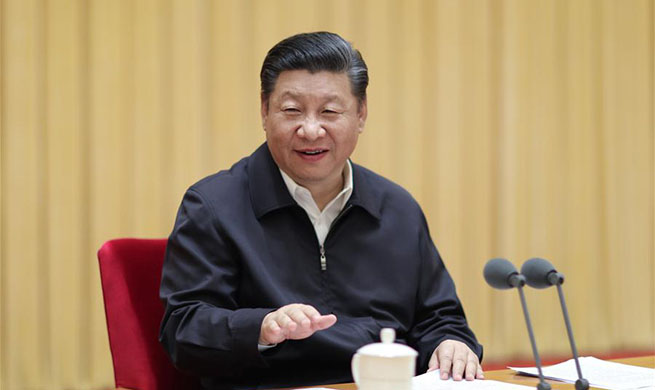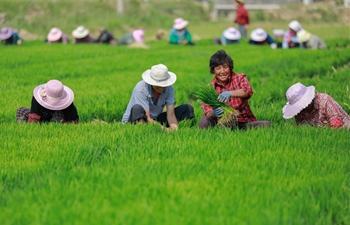GENEVA, June 23 (Xinhua) -- Despite the announcement by the United States to withdraw from the UN Human Rights Council, the council continued its busy work at hand addressing numerous human rights issues and situations at its ongoing 38th session this week.
Throughout this week, together with UN independent human rights experts and members of civil society, representatives are shedding light on the world's human rights situation and demanding change aimed to improve the lives of rights holders.
This effort included an annual full-day discussion on the human rights of women. It also included a number of interactive dialogues with UN rights experts on issues ranging from trafficking in persons to poverty.
During this week, the UN rights officials and experts also showed their concern on the situation of thousands of migrant children forcibly separated from their parents and held in detention in the United States at its southern border.
U.S. Permanent Representative to the United Nations Nikki Haley on June 19 announced in Washington that the United States is withdrawing from the UN Human Rights Council, which UN rights officials responded as "disappointing, if not really surprising".
"Given the state of human rights in today's world, the US should be stepping up, not stepping back," UN High Commissioner for Human Rights Zeid Ra'ad Al-Hussein said shortly after the U.S. announcement.
Vojislav Suc, president of the UN Human Rights Council, told the ongoing 38th session of the Council here in Geneva Wednesday that once he receive the necessary formal notification to this effect, he will ask the Secretariat to rearrange the room accordingly.
Responding to questions from journalists at a regular press briefing on Friday, Ravina Shamdasani, for the Office of the UN High Commissioner for Human Rights, said that the High Commissioner had repeatedly highlighted the significance of multilateralism and the importance of states stepping forward to engage with their human rights responsibilities.
Philip Alston, the UN Special Rapporteur on extreme poverty and human rights, who on Friday reported his findings during his latest US tour on poverty, told the Council, "Human rights promotion requires robust engagement, not behaving like the kid who takes his football and goes home."
Alston noted with regret that Haley had characterized the Human Rights Council as "a cesspool", and had chosen to withdraw from it just days before his presentation.
Speaking of cesspools, Alston said that his report drew attention to those that he had witnessed in Alabama as raw sewage poured into the gardens of people who could never afford to pay 30,000 US dollars for their own septic systems in an area remarkably close to the State capital.
"I concluded that cesspools need to be cleaned up and governments need to act. Walking away from them in despair, as in Alabama, only compounds the problems," he said.
Turning to his report on the United States, Alston noted that the United States had the highest income inequality in the Western world, with 40 million Americans lived in poverty and 18.5 million of those lived in extreme poverty.
"When one of the world's wealthiest countries does very little about the fact that 40 million of its citizens live in poverty, it is entirely appropriate for the reasons to be scrutinized," he stressed.
According to the UN expert, the United States position, expressed by Haley, seems to be that "this council should do far more to hold certain states to account, but that it should exempt the United States and its key allies from such accountability".
The ongoing 38th regular session of the UN Human Rights Council is scheduled to be held here from June 18 to July 6.

















